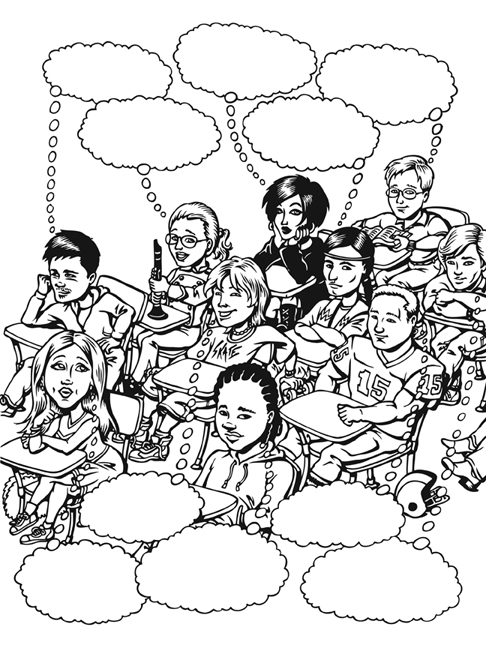Part
One:
The System’s Problem Becomes the Victim’s Problem
Herbert Kohl’s Argument on I Won’t Learn From You! Thoughts on the Role of Assent in Learning
Herbert Kohl’s Argument on I Won’t Learn From You! Thoughts on the Role of Assent in Learning
In this piece Herbert Kohl argues here
that that teachers and school systems are misinterpreting bad or removed
behavior in the classroom as the student’s failing to engage or understand. If
they are acting out or not participating, most of the time it isn’t because
they have had bad teachers or don’t want to learn. Instead it is because they
feel they are not being heard (in the case of bad behaviour) or attacked in some
way. In Barry’s case, he actually didn’t know how to read but the stereotypical image
he was seen in as a non-literate student was enough for him to throw
tantrums when he was put on public display. This non-learning, as Kohl refers
to it, could be because the feel a social loyalty to their culture or because
they are being treated as a minority is a racist way. Either way, they are fighting
against assimilation. By “turning willed refusal to learn into failure to learn
we are not giving the students the support they need to speak out, allowing
them a right to the “tree of life.” (pg. 1/pg.5)
In my eyes, Grandpa Wilfredo, Barry
and Akmir’s concerns, feelings and behaviors are justified. The feel their
survival rests in refusing to assimilate in order to preserve their identity.
They fight authority in order to protect their rights. Instead of digging
deeper, past our assumptions, into why Barry and Akmir have an aversion to
learning, we instead look to who we should blame in the system or their homes. People have every right to their opinion;
this is after all a democracy, so our students must be able to speak their
minds. If they are radical ideas or racist ideals, then the discussion becomes
even more important to have. “Learning cannot take place without respect for
everybody’s voice.” (pg. 3) By allowing the students to say what they think and
to share how they feel they begin to participate more and more in the classroom
and perhaps outside of the classroom as well. And so “the only sane alternative
to not-learning is the acknowledgement and direct confrontation of oppression-social,
sexual, and economic-both in school and in society.” (pg. 5)
Part
Two:
Problem Solving With The Child At The
Helm
Alfie
Kohn’s Argument on Five Reasons to Stop
Saying “Good Job!”
In this piece Alfie Kohn argues here
that we can’t help by praise our students and
children because we are conditioned to do so. Isn’t the right way to encourage
good behaviour by giving the child an “atta-boy”? Kohn says no because by doing so we are
reflecting upon them our opinions of what is right and wrong instead of
allowing them to navigate their own feelings. What’s worse, is by bribing them
to do things with such praise, we are supplying them with vast amounts of
conditional love. So how can we steer them into the direction of finding their
own “good job” feeling? Simply by stating what they have done and asking
them what they think about it. “That card you made Zane had lots of animals
on it and he smiled when you gave it to him!” That way the observation and the
praise rest in the child’s own hands. This technique keeps the child from
seeking our praise instead of their own.
I
was very concerned why I read this article for two reasons. The first was how
could I support students and children in a way that “good job” without actually
saying the words of praise? The second being how to actually break the conditioning
of complementing. I am not exaggerating when I say I dole out the compliments
like smiles. This was going to be a difficult idea to grasp. However, Kohn
relived a bit of my uneasiness with his suggestions. I had always had an
aversion to using the word “no “ too often because it lessens confidence (All
I Really Need To Know I Learned In Kindergarten by Robert Fulghum talks
more about this) , which is probably one reason I want to be an English
teacher, but I didn’t realize that positive words were just as damaging. Children
craving approval do so because we have given them conditional love; you do this
and I will say good things. I had no idea that telling students and children
what was right and wrong was me reflecting my opinions on them. I can’t help
but find myself saying duh! By praising the work is then connected to the praise
they want to receive, they may not even be interested in the material. By
continuing to reach for the praise the proverbial bar gets raised higher and higher
as they strive to keep up the “good job” they have been doing. These reasons
are why we must become a mirror for our students and children instead of a
window “helping a child learn how to solve problems and teaching that their
Questions For Class:
·
How do we allow our students to share their opinions without
causing other students to feel offended?
·
What other ways can we encourage students without using
verbal exclamation points or stickers with said exclamation points?
Picture Links:
Picture Links:
http://rlv.zcache.com/cute_otter_good_job_motivational_sticker-r6cf81f57a7a044679adb646875510438_v9wf3_8byvr_512.jpg



Great job Jocelyn as always .
ReplyDeleteI agree with your points . I really enjoyed the images that you used. Otters are so cute lol. I was also very worried while reading Kohn's piece thinking what am I suppose to say instead?
Can't wait to hear you thoughts on this in class.
Shanelle